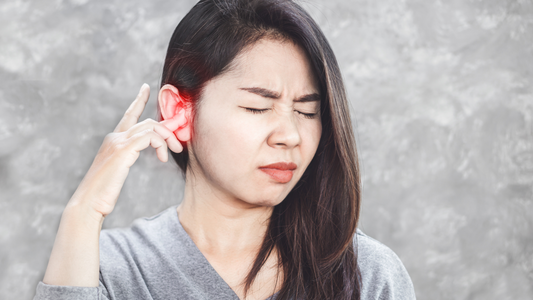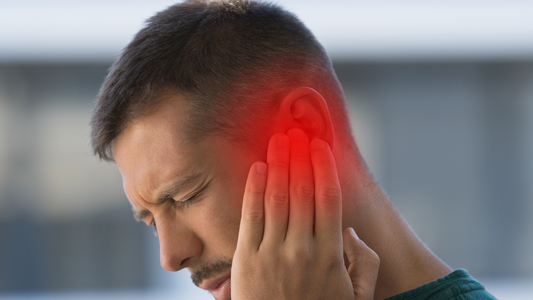Had a jolt recently that sent your heart racing? Maybe a car honking at you out of nowhere? What if that loud noise clung to you long after the streets went quiet? You might be thinking, "What's with this ringing in my ears when everything else is silent?" Truth is, our bodies throw curveballs, and not all are visible.
Perhaps a friend mentioned their ears have been ringing non-stop since a minor fender bender. We're not just dealing with a dent in the car here. They now have a constant companion of noise in their ears—could be ringing, buzzing, or hissing. Curious about why? We'll get to the bottom of it. Let's tackle what messes with our hearing after an accident, and talk about what steps we can take to deal with it.
Understanding Tinnitus Symptoms
You're in a quiet space thinking you'll get a moment of calm, but there's a persistent buzzing or ringing sound that’s all your own. It's not caused by any gizmo in the room; it's a nagging internal hum. That's tinnitus for you. Sometimes it starts at a whisper and grows. For others, it's an ever-present background noise. You might hear a range of sounds: a hiss, whoosh, or an odd clicking with no discernible pattern, like a ghostly metronome gone awry.
So you ask yourself, "Do these sounds just bug me, or do they actually affect my day?" The answer is clear: they can interrupt daily life. Some of you might find these sounds distracting enough to disrupt a conversation or drown out what you're straining to hear. It can get in the way of a good night's sleep, too. You're lying there, ready to drift off, and this noisy intruder is set on keeping you from your slumber. And on particularly trying days, it feels like you're caught in a whirlwind. Not exactly the kind of spinning you were hoping for when you’re desperate for sleep.
- Ringing, buzzing, or hissing sounds without an external source
- Noticing some sounds are much louder than they should be
- Your own voice seems muffled or far away
- Ear discomfort or pain
- Trouble concentrating on tasks or conversations
- Extra stress or irritability
- Trouble falling or staying asleep due to the noise
Types of Accidents with Tinnitus Risks
In a split second, a normal drive can take a turn for the worse, potentially leaving you with a ringing in your ears that nobody else can hear. It's not something we often think about, but accidents big and small could end with tinnitus as an unwelcome companion. The unforeseen force dealt during an accident can jolt your ears just as much as your body, whether it’s a slight knock or a serious thrash.
Take a routine trip down to your local store, for example. Out of the blue, a car blindsides you, resulting in a side-impact crash. The force against your vehicle isn’t just a shock to your system; it can play havoc with the inner mechanics of your hearing. And it's not limited to one type of mishap—several scenarios could end with you struggling with an unseen cacophony:
- A seemingly minor rear-end shunt can have your head snapping back sharply, setting off a frenzy of activity in your auditory system.
- In the chaos of a multi-vehicle pileup, the mix of impacts can dramatically increase the risk of auditory distress.
- Even a simple fender-bender can come back to haunt you later as you're trying to unwind, with a persistent whining noise proving you didn't walk away scot-free.
The jolts and shakes in these moments can batter the cochlea or disrupt the delicate network of auditory nerves. Imagine the after-effects of a rock concert when you’ve left your ear protection at home—that's the sort of relentless ringing we're talking about. So the next time you secure your seat belt, remember that it's not only about preventing the obvious injuries. It’s about sparing your hearing from the silent, lingering impacts of a road accident.
What causes Tinnitus after a car accident

Curious about that ringing in your ears after a fender bender? It could be tinnitus, and let's talk about why it happens. One moment the world's normal, the next you're at a concert no one else can hear. A knock to the noggin during the crash can shake up the ear's inner workings. The ear's got these tiny hairs that pitch sound to your brain - a real shindig can mess them up good, leading to that ringing or buzzing in your ears.
Say you're cruising along and out of nowhere - whack - your head's like a bobblehead. That's your classic case of whiplash, and it doesn't play nice with your neck or your ears. That snap of the head can start a ringing in your ears that's tough to silence. And if you're unlucky enough to get a concussion too, those chimes in your ears could turn into a full-on bell tower.
Now picture your airbag: an inflated balloon popping in your face at breakneck speed to save your hide. Great for avoiding a dashboard to the face, not so much for your hearing. It blasts open with a bang, and if your ears are in the splash zone, they'll be ringing the alarm bells long after the crash.
If you come out of a crash with a symphony in your ears, don't ignore it. Check in with a doc, pronto. Could be nothing, but it could also be your ears telling you something's out of whack. Catching it early could keep that ringing from moving in for good. For more in-depth information, you might want to read about how long tinnitus lasts after whiplash which can help you understand this condition better.
Let's Wrap This Up
Why does my ear still ring after a car bump? It's called tinnitus and your ears are trying to signal that something's out of tune. It's like your private orchestra is constantly rehearsing, and not in a good way. This ringing can be a sign that your ears took a hit, and it might disrupt your sleep, raise your stress levels, or make conversations tough.
If you're hearing a persistent noise after an unexpected jolt on the road, don't just brush it off. Your body could be flagging down something important. It's smart to get it checked before it overstays its welcome. And if it turns out your ears could use some support, perhaps you might consider checking out hearing aids from HearWell Group. They could offer some peace and quiet.
Sources & References
- Kreuzer, P. M., Landgrebe, M., Schecklmann, M., Staudinger, S., & Langguth, B. (2012). Trauma-associated tinnitus: Audiological, demographic and clinical characteristics. PLoS One, 7(9), e45599. https://www.ncbi.nlm.nih.gov/pmc/articles/PMC3458888/
- Moring, J. C., Peterson, A. L., & Kanzler, K. E. (2018). Tinnitus, traumatic brain injury, and posttraumatic stress disorder in the military. International Journal of Behavioral Medicine, 25, 312–321. https://www.ncbi.nlm.nih.gov/pmc/articles/PMC7168912/
- Fagelson, M. A. (2007). The association between tinnitus and posttraumatic stress disorder. American Journal of Audiology, 16(2), 107-117. https://pubs.asha.org/doi/10.1044/1059-0889%282007/015%29
- Folmer, R. L., & Griest, S. E. (2003). Chronic tinnitus resulting from head or neck injuries. The Laryngoscope, 113(5), 821-827. https://onlinelibrary.wiley.com/doi/abs/10.1097/00005537-200305000-00010
- Henry, J. A., Dennis, K. C., & Schechter, M. A. (2005). General review of tinnitus: prevalence, mechanisms, effects, and management. Journal of Speech, Language, and Hearing Research, 48(5), 1204-1235. https://pubs.asha.org/doi/10.1044/1092-4388%282005/084%29
- Baguley, D., McFerran, D., & Hall, D. (2013). Tinnitus. The Lancet, 382(9904), 1600-1607. https://www.thelancet.com/journals/lancet/article/PIIS0140-6736(13)60142-7/fulltext

The Hear Well Group Research Team: Trusted Hearing Health Insights
Our experienced research team compiles hearing health data from credible, peer-reviewed sources and presents it in easy-to-understand terminology. We ensure accuracy and trustworthiness, providing up-to-date, evidence-based recommendations to enhance hearing care practices and inform our readers' hearing well-being decisions.


